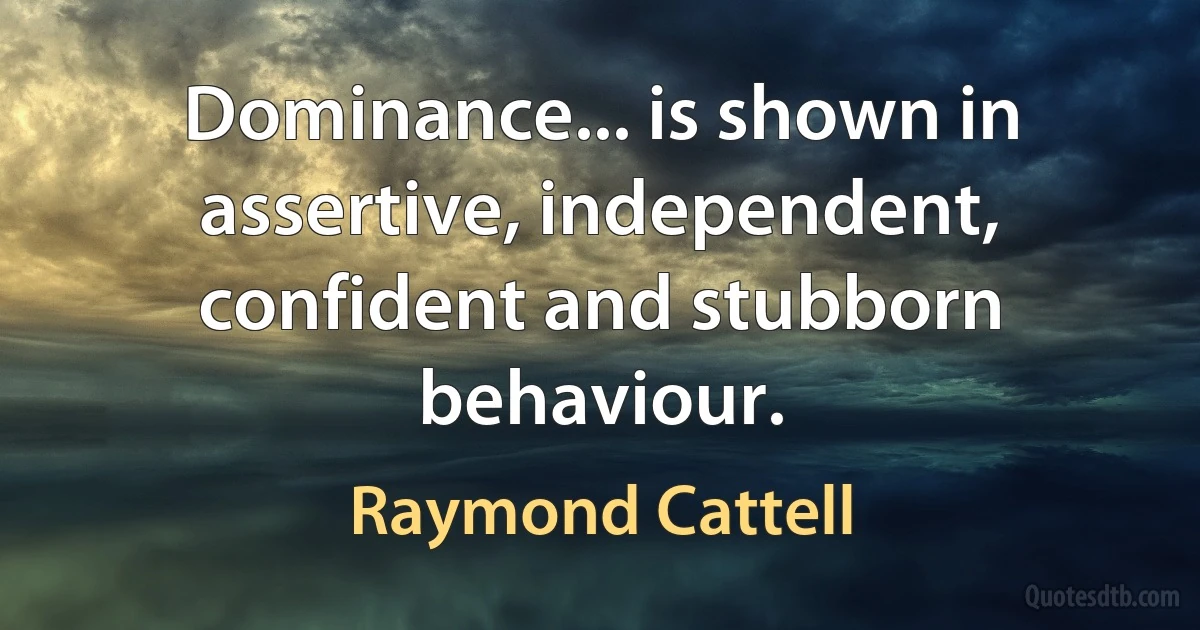Behaviour Quotes - page 9
Biologically, life is not maintenance or restoration of equilibrium but is essentially maintenance of disequilibria, as the doctrine of the organism as open system reveals. Reaching equilibrium means death and consequent decay. Psychologically, behaviour not only tends to release tensions but also builds up tensions; if this stops, the patient is a decaying mental corpse in the same way a living organism becomes a body in decay when tensions and forces keeping it from equilibrium have stopped.

Ludwig von Bertalanffy
In my opinion, the Union Government's decision to impose President's rule in UP is flawed. That some members of the House indulged in violence and unruly behaviour does not warrant the conclusion that the government of the state cannot be carried on in accordance with the provisions of the Constitution.

R. Venkataraman
Gravitation is entirely independent of everything that influences other natural phenomena. It is not subject to absorption or refraction, no velocity of propagation has been observed. You can do whatever you please with a body, you can electrify or magnetise it, you can heat it, melt or evaporate it, decompose it chemically, its behaviour with respect to gravitation is not affected. Gravitation acts on all bodies in the same way, everywhere and always we find it in the same rigorous and simple form, which frustrates all our attempts to penetrate into its internal mechanism.

Willem de Sitter
Not only does it deny the corporate claim to liberty of men and women organized in national societies, but it refuses the much more fundamental claim of men and women to the free expression of human personality, which rests upon the eternal value of every human soul. True pride of race may be tested by the behaviour of its possessors towards their own fellow citizens and towards others. It will forbid conduct to individuals of which they should be ashamed in their private lives. It is thus evidently something far removed from the ideal of a race which by the German philosophy of to-day is called to stamp out the civilization of another. Between these two conceptions there is a great gulf fixed. ... Until these false creeds are abjured, and replaced by a wider toleration, they must continue to excite resistance. The future of humanity must not be left in the hands of those who would imprison and enslave it.

Edward Wood, 1st Earl of Halifax
As therefore, when we consult, not our own pleasures, but that of our friends, our behaviour will be pleasing and agreeable; our first enquiry must be, what those particulars are, with which the greatest part of mankind are universally delighted; and what those are which, in general, they detest, as troublesome and offensive: For thus we shall easily discover, what kind of conduct, in our intercourse with others, is to be avoided, and what to be adopted and pursued.

Giovanni della Casa
Now, as in the Latin and other languages, a yawning fellow is synonymous or equivalent to a negligent and sluggish fellow; this idle custom ought certainly to be avoided; being (as was observed) disagreeable to the sight, offensive to the ear, and contrary also to that natural claim, which every one has to respect. For when we indulge ourselves in this listless behaviour, we not only intimate, that the company we are in, does not greatly please us; but also make a discovery, not very advantageous to ourselves; I mean, that we are of a drowsy, lethargic disposition: which must render us by no means amiable or pleasing, to those with whom we converse.

Giovanni della Casa
Economic theory, in every branch, deals with practical affairs. Its subject is human welfare, and it is never entirely dissociated from the practical question of how human welfare is to be promoted. But it is a special characteristic of the art of central banking that it deals specifically with the task of an authority directly entrusted with the promotion of human welfare. Human welfare, human motives, human behaviour supply material so baffling and elusive that many people are sceptical of the possibility of building a scientific edifice on so shifting a foundation. But however complex the material, and however imperfect the data, there is always an advantage to be gained from systematic thought.

Ralph George Hawtrey
The bourgeois ... necessarily regards all behaviour that bursts ‘spontaneously' forth from the individual ignorant of its causality, as above all free. Therefore the instincts are conceived as freely striving for unconscious goals, and psychology becomes the adventures of the free instincts in their struggles against the restraints of the environment (in Freud, of society) which impede and cripple their freedom. Out of this struggle cognitive and emotional consciousness is born.Now the only objection to this bourgeois psychology is that it inverts the picture. The instincts are not free springs of connation towards a goal. They are, so far as they can be abstractly separated, unconscious necessities, as Kant realised. They are unfree.

Christopher Caudwell
Conduct, of course, is possible without science. Humans carried on in their daily affairs long before the first spark of science had been struck. And today there are millions of people living whose actions are not determined by anything we call science. Science, however, could not but gain an increasing influence on human behaviour. To describe this influence roughly and briefly will throw a new light on science. Exaggerating and schematizing the differences, we can say: in the prescientific stage man behaves in a situation as the situation tells him to behave. To primitive man each thing says what it is and what he ought to do with it: a fruit says, "Eat me"; water says, "Drink me"; thunder says, "Fear me," and woman says, "Love me."

Kurt Koffka
Information practice is concerned with facilitating the interaction between knowledge seekers – through channels – with knowledge (personal and recorded). Stepping back from practice, we may see the role of the science as exploring the characteristics of people and their "information behaviour”, the features of knowledge records of every kind, the variety of channels (oral, written, printed, graphic, digital) that may be used to transmit information, and how the three elements interact.

Brian Campbell Vickery
When [Capt. Pascal] saw me he appeared a good deal surprised, and asked me how I came back? I answered, 'In a ship.' To which he replied dryly, 'I suppose you did not walk back to London on the water.' As I saw, by his manner, that he did not seem to be sorry for his behaviour to me, and that I had not much reason to expect any favour from him, I told him that he had used me very ill, after I had been such a faithful servant to him for so many years; on which, without saying any more, he turned about and went away.

Olaudah Equiano
In this world, not only samurai, but also servants down through the lower classes are born with different characters, and people are apt to misjudge them by appearance. First, men with discrimination will be viewed as schemers; second, men with deep far-sightedness will be seen as cowards; and third, men with rough behaviour will be mistaken for real warriors. These are great errors.

Takeda Shingen
There is always trouble if meat is not divided by lot. Someone immediately says that he has been given more than his share, and tries to hand a piece to someone else. Then there is much arguing and swearing by God, with everyone insisting that he has been given too much, and finally a deadlock ensues which can only be settled by casting lots for the meat – as should have been done in the first place. I have never heard a man grumble that he has received less than his share. Such behaviour would be inconceivable to the Bedu, for they are careful never to appear greedy, and quick to notice anyone who is.

Wilfred Thesiger


![This exchange – mainly in the form of letters [between the brothers van Gogh] – was not only about painting and art, but covered everything to do with one's existence and the philosophical or religious colouring, in a word: for the reader of the letters written by Vincent to his brother a total of human behaviour is revealed that of the dual being of van Gogh. This is how my first wish and then obsession was started, to build a monument for the two van Gogh brothers. (Ossip Zadkine)](https://cdn.quotesdtb.com/img/quotes_images_webp/45/ossip-zadkine-art-brother-852845.webp)
